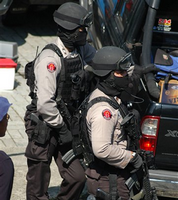After Indonesian authorities gunned down Southeast Asia's most-wanted terrorist, Noordin Mohammad Top, last month, Indonesian President Susilo Bambang Yudhoyono remained cautiously optimistic, stating at the time that Jakarta had "just won a battle" in its broader war against terrorism. Yudhoyono was probably right to strike such a balanced tone in his remarks. While Top's death is a major blow to Islamic militancy in Southeast Asia, it is hardly the final nail in its coffin. And even as Jakarta's "law and order approach" to eradicating terrorism continues to net key terrorist operatives, it has come under increasing scrutiny for eroding the fabric of Indonesia's democracy and ignoring the root problem of ideological extremism.
Top's death leaves a huge leadership vacuum in Southeast Asia's terrorist networks. As head of al-Qaida for the Malay Archipelago -- a radical splinter cell within the regional terrorist outfit Jemaah Islamiyah (JI) -- Top masterminded a series of deadly bombings in Indonesia that have killed hundreds since 2002, including the recent July 17 twin hotel bombings in Jakarta. He used his charm to indoctrinate adherents and martyrs with an al-Qaida ideology, and his technical skills and elusiveness to channel funds from across the Muslim world, organize attacks on Western targets, and evade nearly 17 different arrest attempts. Since few people have Top's wide-ranging skill, experts say he will be hard to replace. His death, which occurred after a nine-hour siege in his Central Javan hideout, also attests to the strength of Indonesia's professional counterterrorism unit, Detachment 88, which has been trained and funded partly by the United States and Australia.
But though this is a major blow to violent jihadism in Southeast Asia, it is hardly the knockout punch. As elsewhere, terrorism in the region is a hydra-headed beast, and though Top's charisma will be hard to replace, he is suspected to have six disciples, any one of whom could fill his shoes. Future leadership might also emerge from the many radicalized youths currently moving through Indonesia's jihadist boarding schools. Furthermore, though a major figure is gone, terrorism expert Rohan Gunaratna warns that what he calls the "superstructure" of terrorism -- by which he means the distribution of terrorist and extremist propaganda, fundraising, procurement, safe-houses, training, and other support functions -- is still intact. Recent investigations into this superstructure are worrying, with Indonesian police learning last month that the funding for the July 17 attacks came from Saudi Arabia. Together with laptops and documents seized from Mr. Top's safehouse, the evidence suggests that despite the waning threat of terrorism in Southeast Asia, financial ties with Middle East extremists remain robust.

